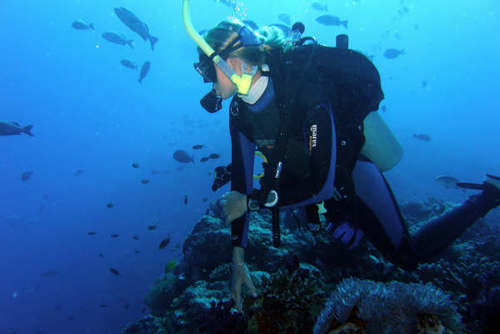The Fijian archipelago lies scattered lazily in the achingly blue waters of the Pacific Ocean, bathed in the radiant antipodean sunlight. Its towns and villages are veritable melting pots of cultural influences.
Fiji's irresistible shores are fringed with picture-perfect palm trees, and the azure waters that surround the islands are inhabited by an astonishing array of marine creatures; over 1,200 species of fish including clownfish, triggerfish, blue tangs, 12 species of whales, dolphins, anemones, soft coral and much more.
Enjoy fragrant sun drenched days and exotic nights of delectable food cooked in a traditional underground oven. Fiji will enchant you with its infectious, chilled out "Fiji time" lifestyle, its heavenly beaches and surrounding mountains of rainforest– the perfect paradise location for your Frontier adventure!
WHAT DOES THE PROJECT DO?
The aim of Frontier-Fiji Marine Conservation Project is to better understand the marine resources of the island of Beqa, and to provide teaching and training to enable local communities to make informed decisions regarding the management of their coastal ecosystems.
To achieve this mission, we conduct scientific baseline data surveys of reef areas. Once a long-term data set is obtained, patterns of resource use can be identified and work with local communities can begin to build awareness of the value and vulnerability of their marine environment.
WHAT WILL I BE DOING?
The marine research and conservation programme is run in association with the University of the South Pacific. The work aims to provide the local stakeholders, research organisations and government bodies with the information they need to design and implement management plans for the future protection of Beqa island and lagoon marine ecosystem.
To gather the data needed you will be diving to locate and map the extensive coral reefs and study the various communities living on them (if necessary you will learn to dive first). To do this you will deploy a wide range of newly learned research skills and scientific techniques including: underwater visual census of reef and commercial fish such as triggerfish and parrotfish, indicator species (both fish and coral), assessment of algal and coral cover to determine the extent of coral bleaching and damage, and line intercept transects for benthic life and indicator invertebrate species such as nudibranchs.
With so much to learn it's worth noting that those joining for only a few weeks will be training most of the time and may not get to do a lot of surveying. You may record observations of the feeding habits and behaviour patterns of a range of marine life. You may even get to study the impact of artisanal fishing on the coral reefs or report the effects of Global Warming on marine communities. The type of fieldwork underway will depend on the time of year and the content of the research program when you join up and how long you are joining for.
Whilst diving, you'll see an extraordinary array of animals from turtles to rays, sea cucumbers to feathery starfish, spiny urchins to octopus and jellyfish. When you motor out each day on the Frontier boat to distant dive sites you may even encounter flying fish, sharks and dolphins. By the end of your project you will be expert at identifying vast numbers of colourful and patterned reef fish as well as being an experienced and competent diver. Although the work is intense and challenging you'll get immense satisfaction from having survived and from having made a valuable contribution to the conservation of this untarnished marine wilderness. You will return home with the new friends you've made and a wealth of fascinating stories and memories.
You'll find your team to be a fun, dynamic mix of ages and experiences, with members who all share a passion about travelling in developing countries and saving endangered life. Your staff will be young, friendly individuals who are highly experienced in their field and many have volunteered on a Frontier project earlier in their career.


